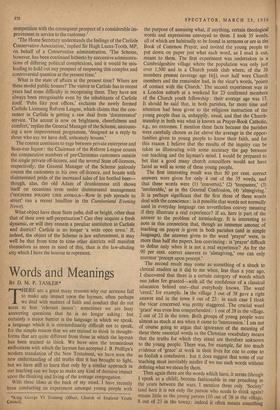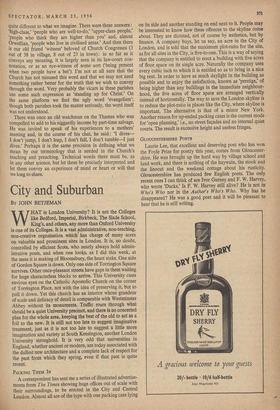Words and Meanings
BY D. M. P. TASKER* With these ideas at the back of my mind, I have recently been conducting an experiment amongst young people with
*King George VI Training Officer, Church of England Youth Council.
the purpose of assessing what, if anything, certain theological words and expressions conveyed to them. I took 35 words, all of which are habitually to be found in sermons or are in the Book of Common Prayer, and invited the young people to put down on paper just what each word, as I read it out, meant to them. The first experiment was undertaken in a Cambridgeshire village where the population was only just over 1,500 and in a Church youth club where, of the 38 members present (average age 16k), over half were Church members and the remainder had, in the vicar's words, 'points of contact with the Church.' The second experiment was in a London suburb at a weekend for 23' confirmed members of the Church youth fellowship : their average age was 17. It should be said that, in both parishes, far more time and attention had been given to the religious instruction of the young people than is, unhappily, usual, and that the Church- manship in both was what is known as Prayer-Book Catholic, e.g., no extremes. I mention these facts because the parishes were carefully chosen as far above the average in the oppor- tunities given to young people to know their faith, and for this reason I believe that the results of the inquiry can be taken as illustrating with some accuracy the gap between our teaching and the layman's mind. I would be prepared to bet that a good many church councillors would not have fared as well as some of these young people.
The first interesting result was that 80 per cent. correct answers were given for only 4 out of the 35 words, and that these words were (1) 'converted,' (2) 'trespasses,' (3) 'intolerable,' as in the General Confession. (4) 'almsgiving.' It is perhaps significant that the first three of these words deal with the conscience : is it possible that words not normally used in everyday language can, nevertheless convey meaning if they illustrate a real experience? if so, here is part, of the answer to the problem of terminology. It is interesting to note in this connection that, though an immense amount of teaching on prayer is given in both parishes (and in simple language), the answers given to the word 'prayer' were, in more than half the papers, less convincing : is 'prayer' difficult to define only when it is not a real experience? As for the 90 per cent. correct answers to 'almsgiving,' one can only murmur 'precept upon precept.'
The second result may come as something of a shock to clerical readers as it did to me when, less than a year ago, I discovered that there is a certain category of words which one .takes for granted—with all the confidence of a classical education behind one—that everybody knows. The word 'creed,' for example. In the village 3 out of 38 gave a right answer and in the town 9 out of 23: in each case I think the vicar concerned was pretty staggered. The crucial word 'grace' was even less comprehended : 1 out of 38 in the village. 2 out of 23 in the town. Both groups of young people were almost as much at sea when it came to 'intercession.' I am not of course going to argue that ignorance of the meaning of these three essential words in the Christian vocabulary means that the truths for which they stand are therefore unknown to the young people. There was, for example, far too much evidence of 'grace' at work in their lives for one to come to so foolish a conclusion : but it does suggest that some of our teaching must inevitably misfire if we use such words without defining what we mean by them.
Then again there are the words which have, it seems (though I speak as a child), become fashionable in our preaching in the years between the wars. I mention three only. 'Society' (and here it is not only the parson who needs to think again) means little to the young person (10 out of 38 in the village. 8 out of 23 in the town): indeed it often means something quite different to what we imagine. There were these answers : 'high-class,' people who are well-to-do,' upper-class people,' `people who think they are higher than you' and, almost Orwellian, 'people who live in civilised areas.' And then there is our old friend 'witness' beloved of Church Congresses (3 out of 38 in village, 8 out of 23 in town) : in so far as it conveys any meaning, it is largely seen in its law-court con- notation, or as an eye-witness of some sort ('being present when two people have a bet'). I'm not at all sure that the Church has not misused this word and that we may not need something rather better for the truth that we wish to convey through the word. Very probably the vicars in these parishes use some such expression as 'standing up for Christ.' On the same platform we find the ugly word 'evangelism': though both parishes took the matter seriously, the word itself was not understood.
There was once an old watchman on the Thames who was compelled to add to his niggardly income by part-time salvage. He was invited to speak of his experiences to a mothers' meeting and, in the course of his chat, he said : 'I dives— I don't jump, I don't leap, I don't fall, I don't tumble—I just dives.' Perhaps it is the same precision in defining what we mean by our terminology that is needed in the Church's teaching and preaching. Technical words there must be, as in any other science, but let them be precisely interpreted and let them convey an experience of mind or heart or will that we long to share.



































 Previous page
Previous page